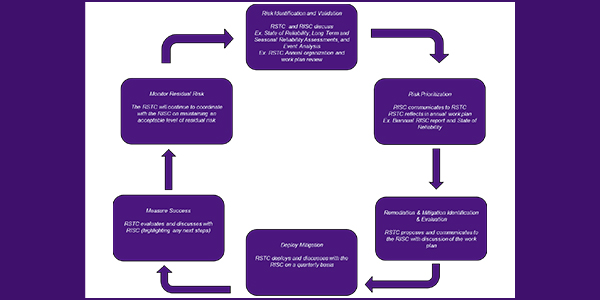NERC’s Reliability Issues Steering Committee (RISC) is planning to bring forward the release of its next ERO Reliability Risk Priorities Report — traditionally published in November of odd-numbered years — to August 2021. The biennial Reliability Leadership Summit will be held earlier next year as well — in January – rather than its usual time in March.
Presenting the expected publication schedule to RISC members via conference call on Thursday, Thomas Coleman, director of risk issue management at NERC, said an August release seemed more “timely” than the traditional November publication date. Work on the report is expected to begin in the fourth quarter of 2020 with the production of the risk template and the release of the industry survey to “prioritize identified risks as well as to potentially identify new and emerging risks.”
Results of the survey will form the basis of discussions among industry leaders at the Reliability Leadership Summit. The last summit, held in March 2019, involved more than 130 regulators, utility officials, RTO executives and other stakeholders. (See NERC Chief: No ‘Appetite’ for Expanding Authority.) The format of next year’s summit has not been finalized, but Coleman said that “more than likely” the meeting will be held online.
“I think we can really have a very interactive and productive [summit] virtually,” he said. “We’ve all been on so many different variations of virtual calls, [and] we’ve seen some really innovative and creative approaches, so I feel strongly that we can develop a really meaningful and impactful virtual meeting in the beginning of 2021.”
Risk Framework Goes to RSTC Next Month

NERC Chief Engineer Mark Lauby updated the committee on NERC’s planned risk mitigation framework, which is currently under development with input from the Reliability and Security Technical Committee (RSTC). The committees hope to finish the framework in time to present it to NERC’s Board of Directors at its November meeting.
Development of the framework began last year in hopes of creating a unified, transparent process to help entities choose the best approach to manage various situations. (See NERC Developing Risk Mitigation Framework.) A preliminary framework was created by the ERO Enterprise with input from the North American Transmission Forum and handed off to RISC for further refinement after the February board meeting.
The latest updates to the framework focus on the relationship between the RSTC and RISC in the risk mitigation process, including a flow diagram that breaks down each committee’s responsibilities at each stage. RISC plans to pass the document to RSTC by Aug. 19 for inclusion in the agenda for its meeting next month. Once RSTC members have provided their input, the committees will finalize the document so that RISC Chair Nelson Peeler and RSTC Chair Greg Ford can present it to the board together.
“What we’d like to do, depending on the views of everyone, is ultimately take this to the board as a joint [proposal], so that it kind of puts a little bit more cement around how we identify and prioritize risks and work on risks in a more formal way,” Lauby said.
RISC Charter Updates Accepted
RISC members also voted to approve proposed changes to the committee’s charter and submit them for acceptance by NERC’s board at its November meeting.
The approved edits are largely cosmetic, aimed at replacing outdated language and aligning the charter with those of other NERC committees. However, Jennifer Sterling of Exelon said she was concerned that the committee would have just one representative from the RSTC, as opposed to one each from the Operating, Planning and Critical Infrastructure Protection Committees that the RSTC replaced earlier this year. (See RSTC Tackles Organization Issues in First Meeting.)
Sterling asked if RISC would be able to achieve the same level of coordination with RSTC as its predecessors with fewer shared members. In response, Peeler said that RISC leadership felt one RSTC representative would be enough to maintain communication, especially since the two committees plan to create more formal bonds going forward.
“The purpose of those committee members being on RISC was for them to maintain alignment and bring issues from their committees, not necessarily to be the technical expert of the committee,” Peeler said. “[But] we’re going to have more coordination between RSTC and RISC formalized … in the framework.”




